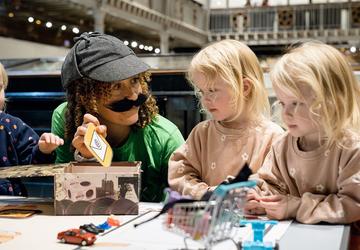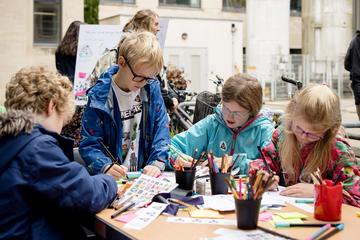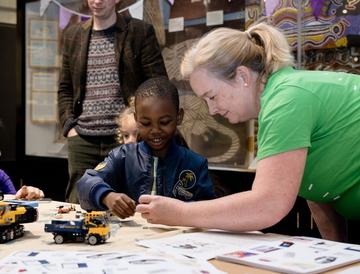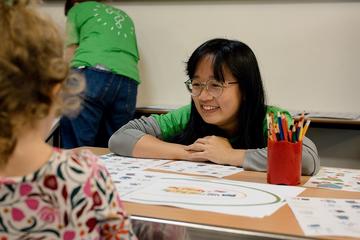Curious minds explore our digital lives at the 2024 Festival of Social Science
In an inspiring programme of activities hosted by the Social Sciences Division in October and November 2024, hundreds of people engaged with social scientists and their research as part of the 2024 ESRC Festival of Social Science.
The annual Festival, which is the UK’s largest celebration of the social sciences, provides an excellent opportunity for researchers of all levels of experience to develop their skills in public engagement. Sharing their research with family audiences were University of Oxford and Oxford Brookes University social science researchers from the fields of anthropology, education, geography, international development, medicine, archaeology, and internet studies. Supported by the University of Oxford’s ESRC Impact Acceleration Account, the exciting programme of interactive events showcased the amazing breadth and diversity of social science research and how it can help us understand and influence the world around us.
The Festival
In a continuation of the creative collaboration between Social Science Division and the Pitt Rivers Museum's research and engagement teams, seven activities took place in the Museum spaces where, on one exciting day in half term, there were over 1,200 interactions between visitors and researchers. The activities – many of which centred around the theme of Our Digital Lives – included everything from discovering how lithium fuels modern life, to testing how well (or not!) language models like ChatGPT can help us lean about the world; exploring what life is like for hermits, and creating poop emojis with our talking toilets! They included:
- Life as a Hermit – visitors entered our atmospheric, candle-lit hermit cave to ‘meet’ a male and a female hermit and think about the essentials of life.
- Tap, Swipe, Toggle, Cook, and Eat! – our visitors had a fantastic time thinking about food delivery apps and role-playing a pizza shop.
- Digital Detective – with a beautifully illustrated game and fun props, our visitors were invited to unravel the mysteries of how everyday digital devices and apps affect our planet’s health.
- My Family’s Digital Lives – visitors used an impressive array of colourful stickers to create fascinating maps of their relationships with technology.
- Talking with Toilets – with Tommy the talking toilet encouraging visitors to think about what makes a good public loo!
- The Digital Material – using Lego and a giant magnetic map, this provided a fascinating look at why Lithium is so important, where it comes from and the impact it has on our environment
- Learning with AI Language Models – visitors raced against the clock to find trivia facts about exhibits in the Pitt Rivers Museum and see if they were cleverer than AI!
Seven other events took place in venues across Oxford, enabling our researchers to connect with diverse audiences in new ways.
- Picture This: self-refection and the visual experience of the Museum – this hands-on workshop for 16-24 year olds encouraged participants to use photography and ‘slow looking’ to create a personal and visual museum experience.
- Video for Impact Showcase – our audience were inspired by innovative research projects presented in fascinating short films that were created through a recent ‘Video for Impact’ training programme.
- Eugenic Iconographies and the Public Imagination – a powerful and timely talk arguing that social media is saturated with eugenic messages, and passionately calling for a more just and equitable society for everyone.
- Creative Multilingual Day for Families – a joyful day of singing, poetry, drama and craft for families, particularly those raising children with multiple languages.
- Songs of Genomics – a musical exploration of genomic testing in healthcare, with a moving performance of co-created songs from the HIVE Choir
- Migration Sounds – a unique opportunity to explore human migration and settlement through field recordings and the artistic responses to those sounds, amplified in the historic Pitt Rivers Museum.
- Art & Nature: exploring green spaces in the Leys with local residents – an inspiring creative workshop for local people to reflect on the value of the green spaces in in their community
Take a look at what our researchers and visitors got up to:




Hear from our researchers
University of Oxford Education DPhil Student Lucy Robinson had a brilliant time putting her public engagement skills to use in the Pitt Rivers Museum: “The Festival of Social Sciences was recommended to me by a fellow student who had been involved in a previous year. From the start, the Festival team were absolutely brilliant in helping to bring my early idea to fruition. The culmination of several months of work was a 1-day event at the Pitt Rivers Museum where I - alongside a friend and fellow DPhil student - spent the day engaging with families to create intergenerational maps that represented their 'digital lives'! It has been a real highlight of my four years as a doctoral student.”
Dr Marius Turda from School of Education, Humanities and Languages at Oxford Brookes University found the Festival a fantastic opportunity for reaching new audiences: "The Festival of Social Science represents an amazing opportunity for researchers to present their work and engage with an audience in a less formal way. But the festival also celebrates innovative ideas and, in my case, it certainly facilitated a wider reception of my exhibition on the legacies of eugenics. The discussions following the event and the feedback received from the audience highlighted the relevance and the impact of my research, drawing out implications for policy and social practice.”
Find out more
About the ESRC Festival of Social Science
The ESRC Festival of Social Science is an annual celebration of the social sciences and a key element of ESRC’s commitment to promote awareness of UK social science research to new audiences. The Festival offers a fascinating insight into some of the country's leading social science research and how it influences our social, economic and political lives – both now and in the future. For more information visit https://festivalofsocialscience.com/
Get involved in public engagement with research
If you’re interested in public engagement with research, get in touch with our impact team at impact@socsci.ox.ac.uk
Further resources
- Further information, support, and opportunities for public engagement at Oxford
- Funding for engagement activities from the University of Oxford’s ESRC Impact Acceleration Account
- National Co-ordinating Centre for Public Engagement (NCCPE)


